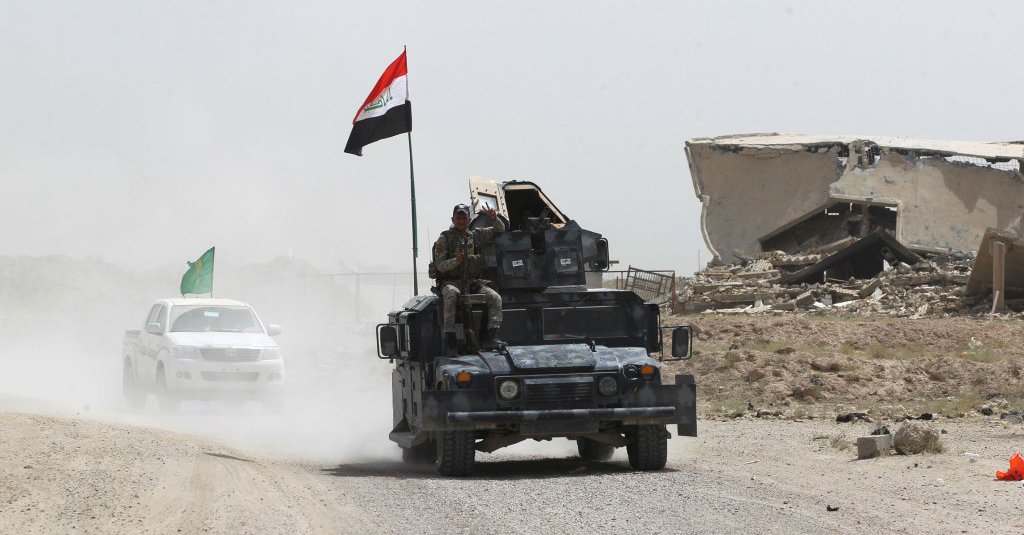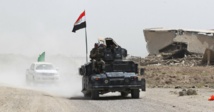"The fact that I am here with my friends today shows our determination and our will to resist," says Ahmad Chehab Ahmad, 23.
Around 40,000 students were studying at the university, one of the biggest in Iraq, when IS seized the city in a sweeping summer 2014 offensive across Iraq and Syria.
Elite Counter-Terrorism Service forces seized the campus back in January as part of a months-long operation to oust the jihadists from the capital of their self-declared "caliphate".
"Less than a month after we were liberated I was back in class," says Sanaa Nafih, minutes before going in for her English exam.
"I feel good, despite all the destruction I see," says the 21-year-old, who hopes to finish her studies and become a teacher.
With Iraqi forces still fighting jihadists across town in Mosul's old city, security at the university is tight.
Heavily armed guards check ID cards and search students at the campus entrance.
The signs of fighting are clear -- some buildings have been completely demolished, while others are pock-marked by shelling and small arms fire.
While the science department remains closed, humanities students have returned after years without setting foot in a lecture hall.
"We girls stayed at home" under IS rule, says Nafih.
"In the beginning we had electricity and we could receive news -- I could use the internet to download books."
"But after a few months the internet was cut off and a period of darkness began," she says. "People could only imagine what was happening in the world."
- 'I broke down in tears' -
Part of the university continued to operate under IS control, mostly serving the relatives of IS fighters, according to a staff member who worked there at the time and asked to remain anonymous.
Before they fled the campus, the jihadists set fire to the university library, turning the large building into a blackened shell.
"Daesh destroyed hundreds of thousands of books, valuable encyclopedias and rare manuscripts," says university employee Zaid Muhieddine, using an Arabic acronym for the group.
"The first time I saw the library in this state, I broke down in tears."
But for Maher, a third-year geography student, life must go on.
"As long as there are classes, it doesn't matter so much that the buildings are burned or destroyed," he says.
The university's management hopes to have courses up and running as normal by October.
In the meantime, it is trying to catch up on exams.
"The clean-up has been finished in most faculties, thanks to volunteering by the city's youth -- both university and school students," says Osama Hamdun of the university's maintenance department.
"In four months they removed thousands of tons of rubble and remnants of the fighting."
Re-opening the university is a "message to the world", he adds.
"Mosul is a city of civilisation. Neither Daesh nor anyone else can break the will of Mosul's people to live," he says.
----------------------------------------------------------------------------------------------------------------------
Around 40,000 students were studying at the university, one of the biggest in Iraq, when IS seized the city in a sweeping summer 2014 offensive across Iraq and Syria.
Elite Counter-Terrorism Service forces seized the campus back in January as part of a months-long operation to oust the jihadists from the capital of their self-declared "caliphate".
"Less than a month after we were liberated I was back in class," says Sanaa Nafih, minutes before going in for her English exam.
"I feel good, despite all the destruction I see," says the 21-year-old, who hopes to finish her studies and become a teacher.
With Iraqi forces still fighting jihadists across town in Mosul's old city, security at the university is tight.
Heavily armed guards check ID cards and search students at the campus entrance.
The signs of fighting are clear -- some buildings have been completely demolished, while others are pock-marked by shelling and small arms fire.
While the science department remains closed, humanities students have returned after years without setting foot in a lecture hall.
"We girls stayed at home" under IS rule, says Nafih.
"In the beginning we had electricity and we could receive news -- I could use the internet to download books."
"But after a few months the internet was cut off and a period of darkness began," she says. "People could only imagine what was happening in the world."
- 'I broke down in tears' -
Part of the university continued to operate under IS control, mostly serving the relatives of IS fighters, according to a staff member who worked there at the time and asked to remain anonymous.
Before they fled the campus, the jihadists set fire to the university library, turning the large building into a blackened shell.
"Daesh destroyed hundreds of thousands of books, valuable encyclopedias and rare manuscripts," says university employee Zaid Muhieddine, using an Arabic acronym for the group.
"The first time I saw the library in this state, I broke down in tears."
But for Maher, a third-year geography student, life must go on.
"As long as there are classes, it doesn't matter so much that the buildings are burned or destroyed," he says.
The university's management hopes to have courses up and running as normal by October.
In the meantime, it is trying to catch up on exams.
"The clean-up has been finished in most faculties, thanks to volunteering by the city's youth -- both university and school students," says Osama Hamdun of the university's maintenance department.
"In four months they removed thousands of tons of rubble and remnants of the fighting."
Re-opening the university is a "message to the world", he adds.
"Mosul is a city of civilisation. Neither Daesh nor anyone else can break the will of Mosul's people to live," he says.
----------------------------------------------------------------------------------------------------------------------









 Home
Home Politics
Politics











